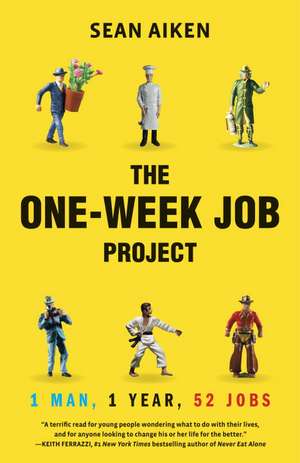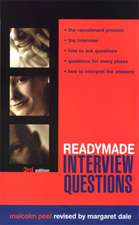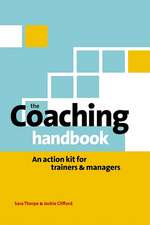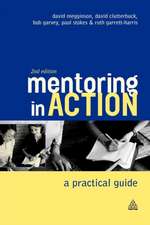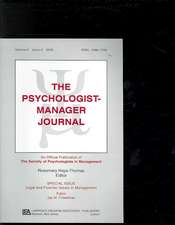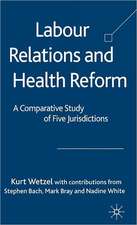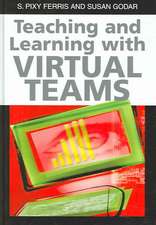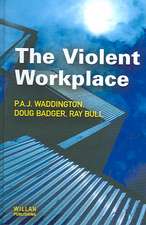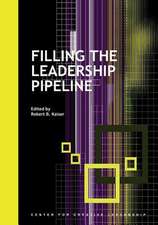The One-Week Job Project: One Man, One Year, 52 Jobs
Autor Sean Aikenen Limba Engleză Paperback – 30 apr 2010
A year and a half after he graduated from college, Sean Aiken found himself struggling to answer the question “What should I do with my life?” His mother suggested teaching. His older sister told him to apply for an entry-level corporate position. His father said, “It doesn’t matter what you do, just make sure it’s something you’re passionate about.” Taking his father’s advice to heart, Sean created the One-Week Job Project and launched himself on an epic journey to find his passion. His goal: to work fifty-two jobs in fifty-two weeks.
After the launch of his website, oneweekjob.com, the offers began pouring in. Sean’s first gig was—literally—jumping off a bridge, as a bungee operator in British Columbia. From there he traveled across Canada and the United States, reinventing himself as a firefighter, an aquarium host, a radio DJ, a martial arts instructor, an NHL mascot, and a snowshoe guide. During the course of his seven-day stints, from a Florida stock-trading floor to a cattle ranch in the wilds of Wyoming to a real estate office in Beverly Hills, Sean found time to make new friends and even fall in love. Whether choosing a spring fashion line, brewing beer, or milking a cow, Sean continued to ask himself and others about what success really means and how we find happiness—all while having the adventure of his life.
Inventive and empowering, witty and wise, The One-Week Job Project is a book that will give you the courage to follow your passion. Or, as Mark Twain said, “Explore. Dream. Discover.”
Preț: 111.70 lei
Nou
Puncte Express: 168
Preț estimativ în valută:
21.38€ • 22.13$ • 18.07£
21.38€ • 22.13$ • 18.07£
Carte disponibilă
Livrare economică 12-26 februarie
Preluare comenzi: 021 569.72.76
Specificații
ISBN-13: 9780345508034
ISBN-10: 0345508033
Pagini: 300
Ilustrații: CH-OPENING B/W PHOTOS
Dimensiuni: 132 x 204 x 18 mm
Greutate: 0.23 kg
Editura: Villard Books
ISBN-10: 0345508033
Pagini: 300
Ilustrații: CH-OPENING B/W PHOTOS
Dimensiuni: 132 x 204 x 18 mm
Greutate: 0.23 kg
Editura: Villard Books
Notă biografică
Sean Aiken graduated from Capilano College in North Vancouver, British Columbia, with a degree in business administration in 2005. At the top of his class, with a 4.0 cumulative GPA, he was voted class valedictorian. He started the One- Week Job project in February 2007, at age twenty- five, and finished his 52 weeks in March 2008.
Extras
WEEK 1
JOB: JUMP MASTER
LOCATION: Whistler, British Columbia
EMPLOYER: Whistler Bungee
WAGE: $10-$15 hour*
INDUSTRY IQ:
• InVanuatu, a boy's acceptance into manhood involves jumping off a wood platformover two stories high with only vines attached to his feet (his head must touchthe ground).
• Theworld's highest recorded jump is 760 feet, with 4-5 seconds of free fall,reaching speeds up to 125 miles an hour.
• Eachbungee cord lasts about 600-800 jumps and costs approximately $800-$1,300.
APPLICATION PROCESS: My soccer coach is part owner of thecompany.
WHAT I LEARNED: Jumping off a bridge attached to anelastic cord is surprisingly safe.
Many jump masters say it's safer than driving your car towork. That comparison has never offered me much comfort, but I'm told that onebungee jump is as dangerous as driving a car one hundred miles. Since mostpeople don't drive a hundred miles to get to work, I guess I'll buy it.
*Source: employer. Most of the wage information I'veincluded has come from my employers. I will specify when I've used othersources. The notation "BLS" is used for information from the U.S.Bureau of Labor Statistics' Occupational Outlook Handbook, 2008(www.bls.gov/oco/).
You can't overthink it. You just gotta jump.
-Matt, jump master, Whistler Bungee
The cheers from the crowd quickly faded as I plummeted160 feet toward the river below. My eyes struggled to stay open as wind crashedagainst my face, then resonated loudly in my ears. Ten feet short of the river,I felt a sharp tug on my harness and my view quickly shifted to the metalbridge above. Moments later, I was suspended in the river canyon while Mattlowered a rope to me.
It was only when I was back with both feet on the bridgethat I realized how much fun I'd just had. Now I was one of the crowd. I couldadd to the peer pressure of the countdown that faced the next jumper-jump orface the disapproving sighs of the peanut gallery.
It was my first day on the job, though I didn't dare tellthat to the jumpers who desperately sought some form of reassurance as Itightened their harnesses. "No worries," I'd say. "You'll loveit." Then I'd politely ask that they sign the waiver that would absolvethe company of any responsibility if something happened to go wrong.
It was a week of firsts for me; I also got my firstcellphone. Even though Zack Morris had introduced me to cellphones at a youngage, I'd never had one. I still didn't wear a watch, but now that I had acellphone with official satellite time, I was confident that I'd be able tocure my habit of being five minutes late to everything-never ten or fifteen,always just under five. I've always suspected that this has something to dowith what I call microwave time.
Almost every day after middle school I'd come home andput last night's leftovers in the microwave for a minute and a half. Then I'dgrab a glass from the cupboard, take some juice out of the fridge, pour someinto the glass, put the juice back into the fridge, take a long, dramatic drawn-outdrink, stare out into the backyard to watch the birds take turns at the feeder,and ponder my homework. Then I'd walk to the living room, flip on the TV, tunein to a brilliant lineup of late-afternoon programming: Saved by the Bell, FullHouse, and The Fresh Prince of Bel-Air. Then, stalling for time, I'd slowlymeander back to the kitchen and glance at the microwave, and there'd still beat least twenty-five seconds to go. Microwave time takes forever. Sometimes I'drush around to see how much I could do before the microwave beeped. To thisday, it never fails to surprise me. And so, I blame microwave time for my falsesense that I can fit more tasks into a fifteen-minute period than is humanlypossible.
But back to my week of firsts. That week, I also had my first-everradio interview. I sat in the interview chair across from Bill, a well-knownVancouver radio host. Somewhere in his sixties, Bill spoke with his deep radiovoice and a "Can you believe this guy" attitude: "This morningwe have a young man who thinks he's a jack-of-all-trades. Sean Aiken graduatedfrom college top of his class, a 4.0 GPA, he was even voted class valedictorian-onewould think that he could find himself at least one decent job. But Sean sayshe wants fifty-two! Welcome to the show, Sean."
"Thanks for having me," I replied.
"So, tell us a bit about this idea of yours,"he said, a hint of mockery in his voice.
I felt like I was being set up. "Well, I don't knowwhat I want to do for a career, but I made a promise to myself that whatever itis, it's going to be something I'm passionate about," I cautiouslyreplied. "So I came up with this idea to try out different jobs, to seewhat I like and don't like, and learn from others about how they decided on acareer."
It was like he hadn't even heard me. "This is justso wacky," he said with a smirk. "So, you want employers to hire youwith no prior experience, spend the time to train you, and then at the end ofthe week, you say Goodbye, then go elsewhere?"
"Yeah, that's right," I said.
He couldn't get past the concept and didn't even try tograsp my reasons. I admit, my idea was a little wacky, especially when comparedwith the traditional route: Go to school, get a job, buy stuff, start a family,buy more stuff, retire, die. But far more wacky is the number of people who getout of bed in the morning and absolutely dread going to work because they hatetheir jobs. I was trying to avoid that fate. I wanted to find something thatI'd love. Something that I'd gladly spend forty hours of my life doing eachweek and that would allow me to pay the bills. Whether this was possible orsimply the unrealistic hope of an inexperienced, idealistic twenty-something, Iwasn't sure. But I worried this same hope could easily become regret if I didn'tfind out for myself.
Back on the bungee bridge Friday afternoon. A teenagegirl looked up at me skeptically while I tightened her harness. "So, isthis thing, like...safe?"
"Yeah, totally safe."
She didn't seem convinced. "Seriously," Iassured her. "One might even say..." I paused for effect, thencompellingly added, "...safer than driving your car to work."
WEEK 2
JOB: TV TALK SHOW INTERN
LOCATION: Vancouver, British Columbia
EMPLOYER: Urban Rush
WAGE: None-typically volunteer
JOB DESCRIPTION: Greeted guests in the greenroom, helped out around the studio, learned how to work the camera, brainstormed ideas forfuture shows, and shot a couple of short segments.
APPLICATION PROCESS: Jay, a producer at the show, heardmy previous week's radio interview and contacted me through the One-Week Jobwebsite.
WHAT I LEARNED: Passion increases productivity.
All the staff at Urban Rush love their jobs, and so theyhappily work hard to ensure the show's success. They're often laughing,generally in a good mood, and always eager to contribute their ideas for theshow at the daily meeting.
During my week, the hosts of the show, Mike and Fiona,would mention on air how they were doing their best to make my experience atthe studio worthwhile, then they'd cut to a shot of me organizing theirwardrobe, washing windows, being loaded up with a ridiculous number of tapes tosort through, or walking one of their dogs. This fun attitude created apositive work environment, but more important, it added to the creativity ofthe production. Simply put, people who love their job do it better.
WEEK 3
JOB: SNOWSHOE GUIDE
LOCATION: North Vancouver, British Columbia
EMPLOYER: Mount Seymour
WAGE: $10-$15 hour
INDUSTRY IQ:
• Traditionalsnowshoes were made with wood frames and rawhide lacings. Today, most use lightmetal or plastic.
• Weburn 45 percent more calories snowshoeing than walking or running at the samespeed.
• Snowshoeingoriginated in present-day central Asia between four thousand and six thousandyears ago.
• Thelowest recorded temperature on earth is -128.6 degrees F., in Antarctica (notideal snowshoeing conditions).
APPLICATION PROCESS: My friend Erin replied to my initialemail about the project. She said that I could work with her as a snowshoeguide giving daily tours to high school students. I didn't want to take manyjobs from people I knew, but with only a couple of days to line up my nextposition, I accepted the offer. As I drove up the mountain with the sunshining, seven inches of fresh snow on the ground, and the promise of unlimitedhot chocolate, I was glad I did.
WHAT I LEARNED: I really enjoy working outdoors.
I never thought I'd be someone to work outdoors. But nowthat I've experienced it, I can understand why many who do never go back to anoffice environment.
When I arrived at the lodge, I was introduced to a man inhis forties named Garry. Garry had recently moved to Canada from England, wherehe was a software developer for a successful IT firm. Now, halfway across theglobe, Garry was a snowshoe guide for high school students. Most of the otherguides were in their twenties; needless to say, Garry, with his thinning grayhair and English accent, stood out. "All right, Sean, looks like you'rewith me this morning on trail maintenance. Let's get going," he said, thenhanded me a pair of snowshoes.
It was late in the season. Temperatures were rising, andthe snow had begun to melt. Each morning the trails had to be walked to ensurethat routes were still safe to pass and to fix signs that had been knockeddown.
Snowshoes and backpack in hand, Garry eagerly made hisway for the door. We strapped on our snowshoes and set out into the crispmorning sunlight. The mountain hadn't opened to the public yet, and so onlyemployees were visible-several prepared the main lifts, while others shoveledthe walkway into the base lodge. There was a heightened awareness to the calm;we knew that with the fresh snow, the crowds would soon arrive.
We passed the final chairlift and entered the firsttrail. With no tracks to follow, we were guided by large fir trees on eitherside. It was quiet, except for the clicking of our metal snowshoes as they cutthrough the light powder. The striking scenery removed any obligation to makeidle conversation and at the same time added a sense of purpose to eachexchange.
"Erin mentioned that you were a software developerback in England," I said. "That's quite the career change."
Garry's stride and facial expression were unchanged, andI wondered whether he had heard me. I decided to probe further. "How didthat lead to the snowshoe guide job in Canada?" I asked.
"Well, I've always loved the outdoors," he saidafter a long pause. "So, when my wife got a job that would bring us toCanada, she said, 'Well, if you love the outdoors so much, why don't you tryfor a job in the outdoors?' "
Following his passion came with a huge pay cut, Garrysaid. But he assured me he'd made the right decision. "My friends back inEngland can't believe the change that I've made. They can't imagine making thatleap themselves," he said. "But, I'm finally doing a job that I'mpassionate about. I really love this job. It's fantastic-the best jobever."
We continued to tread through the dense forest, followingthe trails, picking up toppled signs and wedging them into firmer snow.
In taking a much lower-paying job in a new field, Garrycould be accused of suffering a midlife crisis. His father thought he wascrazy. But after I'd spent a few hours with Garry, it was obvious to me that heknew exactly who he was and why he'd made the choices he had.
"Why was it so important for you to make such adrastic change and pursue something you loved?" I asked.
"Life's about chances. It's too short not to takethose chances. The way I always look at it is, I don't want to be sixty-fivethinking, Ah, I wish I'd done that. If I do it and it doesn't work out, thenfine, it didn't work, try something different. But I don't want to be sittingthere for the rest of my life regretting the things that I didn't do, because Ithink that's a sad waste of your life."
I was glad I'd asked. Not only did Garry seem to share myperspective, but things tend to sound more profound in an English accent.
"Have a play around in the job market, do jobs thatyou think you're going to enjoy, and if you don't enjoy them, get out and gotry something else," he continued. "It's a lot easier to do whenyou're young than it is when you're my age."
Shortly after our talk, we emerged from the trail andspotted the base up ahead. Several large noisy groups of schoolkids wererunning around, throwing snowballs at one another, as a couple of othersnowshoe guides attempted to calm them down.
Garry laughed. "You sure you're ready for this,mate?"
"Yeah," I said, smiling. "I'm ready."
WEEK 4
JOB: COACH: VOLLEYBALLCAMP
LOCATION: Burnaby, British Columbia
EMPLOYER: Volleyball BC
WAGE: $15 hour
JOB DESCRIPTION: Along with two other coaches, I organized the camp schedule, led skill demonstrations, training drills, andvarious games.
INDUSTRY IQ:
• Approximately10 million children attend camp annually in the United States.
• Theaverage salary for a NCAA Division I-A college football coach is over $1million.
APPLICATION PROCESS: I played on the men's varsityvolleyball team at college, so I had many friends involved in the volleyballcommunity.
WHAT I LEARNED: Sometimes you can never be well enoughprepared.
I only had one day to organize the schedule with theother two coaches before the camp started, but even if we'd had the entireprevious week, I doubt it would have mattered. After my first day I realizedthat it would be an astounding feat to successfully hold the attention of fiftykids, age ten to fifteen, for eight hours a day. Especially when those kidswere spending their spring break indoors at a volleyball camp. I had no chance-evenschool doesn't last eight hours.
WEEK 5
JOB: REPORTER
LOCATION: Vancouver, British Columbia
EMPLOYER: Vancouver 24 Hours
WAGE: $31,690 year [Source: BLS]
INDUSTRY IQ:
• Acolumnist is often not an employee of the newspaper. The columns are purchased with a first publishing right, after which the columnist can sell the same pieceto other publications.
• Columnistsare paid per word or a flat rate for each piece.
JOB: JUMP MASTER
LOCATION: Whistler, British Columbia
EMPLOYER: Whistler Bungee
WAGE: $10-$15 hour*
INDUSTRY IQ:
• InVanuatu, a boy's acceptance into manhood involves jumping off a wood platformover two stories high with only vines attached to his feet (his head must touchthe ground).
• Theworld's highest recorded jump is 760 feet, with 4-5 seconds of free fall,reaching speeds up to 125 miles an hour.
• Eachbungee cord lasts about 600-800 jumps and costs approximately $800-$1,300.
APPLICATION PROCESS: My soccer coach is part owner of thecompany.
WHAT I LEARNED: Jumping off a bridge attached to anelastic cord is surprisingly safe.
Many jump masters say it's safer than driving your car towork. That comparison has never offered me much comfort, but I'm told that onebungee jump is as dangerous as driving a car one hundred miles. Since mostpeople don't drive a hundred miles to get to work, I guess I'll buy it.
*Source: employer. Most of the wage information I'veincluded has come from my employers. I will specify when I've used othersources. The notation "BLS" is used for information from the U.S.Bureau of Labor Statistics' Occupational Outlook Handbook, 2008(www.bls.gov/oco/).
You can't overthink it. You just gotta jump.
-Matt, jump master, Whistler Bungee
The cheers from the crowd quickly faded as I plummeted160 feet toward the river below. My eyes struggled to stay open as wind crashedagainst my face, then resonated loudly in my ears. Ten feet short of the river,I felt a sharp tug on my harness and my view quickly shifted to the metalbridge above. Moments later, I was suspended in the river canyon while Mattlowered a rope to me.
It was only when I was back with both feet on the bridgethat I realized how much fun I'd just had. Now I was one of the crowd. I couldadd to the peer pressure of the countdown that faced the next jumper-jump orface the disapproving sighs of the peanut gallery.
It was my first day on the job, though I didn't dare tellthat to the jumpers who desperately sought some form of reassurance as Itightened their harnesses. "No worries," I'd say. "You'll loveit." Then I'd politely ask that they sign the waiver that would absolvethe company of any responsibility if something happened to go wrong.
It was a week of firsts for me; I also got my firstcellphone. Even though Zack Morris had introduced me to cellphones at a youngage, I'd never had one. I still didn't wear a watch, but now that I had acellphone with official satellite time, I was confident that I'd be able tocure my habit of being five minutes late to everything-never ten or fifteen,always just under five. I've always suspected that this has something to dowith what I call microwave time.
Almost every day after middle school I'd come home andput last night's leftovers in the microwave for a minute and a half. Then I'dgrab a glass from the cupboard, take some juice out of the fridge, pour someinto the glass, put the juice back into the fridge, take a long, dramatic drawn-outdrink, stare out into the backyard to watch the birds take turns at the feeder,and ponder my homework. Then I'd walk to the living room, flip on the TV, tunein to a brilliant lineup of late-afternoon programming: Saved by the Bell, FullHouse, and The Fresh Prince of Bel-Air. Then, stalling for time, I'd slowlymeander back to the kitchen and glance at the microwave, and there'd still beat least twenty-five seconds to go. Microwave time takes forever. Sometimes I'drush around to see how much I could do before the microwave beeped. To thisday, it never fails to surprise me. And so, I blame microwave time for my falsesense that I can fit more tasks into a fifteen-minute period than is humanlypossible.
But back to my week of firsts. That week, I also had my first-everradio interview. I sat in the interview chair across from Bill, a well-knownVancouver radio host. Somewhere in his sixties, Bill spoke with his deep radiovoice and a "Can you believe this guy" attitude: "This morningwe have a young man who thinks he's a jack-of-all-trades. Sean Aiken graduatedfrom college top of his class, a 4.0 GPA, he was even voted class valedictorian-onewould think that he could find himself at least one decent job. But Sean sayshe wants fifty-two! Welcome to the show, Sean."
"Thanks for having me," I replied.
"So, tell us a bit about this idea of yours,"he said, a hint of mockery in his voice.
I felt like I was being set up. "Well, I don't knowwhat I want to do for a career, but I made a promise to myself that whatever itis, it's going to be something I'm passionate about," I cautiouslyreplied. "So I came up with this idea to try out different jobs, to seewhat I like and don't like, and learn from others about how they decided on acareer."
It was like he hadn't even heard me. "This is justso wacky," he said with a smirk. "So, you want employers to hire youwith no prior experience, spend the time to train you, and then at the end ofthe week, you say Goodbye, then go elsewhere?"
"Yeah, that's right," I said.
He couldn't get past the concept and didn't even try tograsp my reasons. I admit, my idea was a little wacky, especially when comparedwith the traditional route: Go to school, get a job, buy stuff, start a family,buy more stuff, retire, die. But far more wacky is the number of people who getout of bed in the morning and absolutely dread going to work because they hatetheir jobs. I was trying to avoid that fate. I wanted to find something thatI'd love. Something that I'd gladly spend forty hours of my life doing eachweek and that would allow me to pay the bills. Whether this was possible orsimply the unrealistic hope of an inexperienced, idealistic twenty-something, Iwasn't sure. But I worried this same hope could easily become regret if I didn'tfind out for myself.
Back on the bungee bridge Friday afternoon. A teenagegirl looked up at me skeptically while I tightened her harness. "So, isthis thing, like...safe?"
"Yeah, totally safe."
She didn't seem convinced. "Seriously," Iassured her. "One might even say..." I paused for effect, thencompellingly added, "...safer than driving your car to work."
WEEK 2
JOB: TV TALK SHOW INTERN
LOCATION: Vancouver, British Columbia
EMPLOYER: Urban Rush
WAGE: None-typically volunteer
JOB DESCRIPTION: Greeted guests in the greenroom, helped out around the studio, learned how to work the camera, brainstormed ideas forfuture shows, and shot a couple of short segments.
APPLICATION PROCESS: Jay, a producer at the show, heardmy previous week's radio interview and contacted me through the One-Week Jobwebsite.
WHAT I LEARNED: Passion increases productivity.
All the staff at Urban Rush love their jobs, and so theyhappily work hard to ensure the show's success. They're often laughing,generally in a good mood, and always eager to contribute their ideas for theshow at the daily meeting.
During my week, the hosts of the show, Mike and Fiona,would mention on air how they were doing their best to make my experience atthe studio worthwhile, then they'd cut to a shot of me organizing theirwardrobe, washing windows, being loaded up with a ridiculous number of tapes tosort through, or walking one of their dogs. This fun attitude created apositive work environment, but more important, it added to the creativity ofthe production. Simply put, people who love their job do it better.
WEEK 3
JOB: SNOWSHOE GUIDE
LOCATION: North Vancouver, British Columbia
EMPLOYER: Mount Seymour
WAGE: $10-$15 hour
INDUSTRY IQ:
• Traditionalsnowshoes were made with wood frames and rawhide lacings. Today, most use lightmetal or plastic.
• Weburn 45 percent more calories snowshoeing than walking or running at the samespeed.
• Snowshoeingoriginated in present-day central Asia between four thousand and six thousandyears ago.
• Thelowest recorded temperature on earth is -128.6 degrees F., in Antarctica (notideal snowshoeing conditions).
APPLICATION PROCESS: My friend Erin replied to my initialemail about the project. She said that I could work with her as a snowshoeguide giving daily tours to high school students. I didn't want to take manyjobs from people I knew, but with only a couple of days to line up my nextposition, I accepted the offer. As I drove up the mountain with the sunshining, seven inches of fresh snow on the ground, and the promise of unlimitedhot chocolate, I was glad I did.
WHAT I LEARNED: I really enjoy working outdoors.
I never thought I'd be someone to work outdoors. But nowthat I've experienced it, I can understand why many who do never go back to anoffice environment.
When I arrived at the lodge, I was introduced to a man inhis forties named Garry. Garry had recently moved to Canada from England, wherehe was a software developer for a successful IT firm. Now, halfway across theglobe, Garry was a snowshoe guide for high school students. Most of the otherguides were in their twenties; needless to say, Garry, with his thinning grayhair and English accent, stood out. "All right, Sean, looks like you'rewith me this morning on trail maintenance. Let's get going," he said, thenhanded me a pair of snowshoes.
It was late in the season. Temperatures were rising, andthe snow had begun to melt. Each morning the trails had to be walked to ensurethat routes were still safe to pass and to fix signs that had been knockeddown.
Snowshoes and backpack in hand, Garry eagerly made hisway for the door. We strapped on our snowshoes and set out into the crispmorning sunlight. The mountain hadn't opened to the public yet, and so onlyemployees were visible-several prepared the main lifts, while others shoveledthe walkway into the base lodge. There was a heightened awareness to the calm;we knew that with the fresh snow, the crowds would soon arrive.
We passed the final chairlift and entered the firsttrail. With no tracks to follow, we were guided by large fir trees on eitherside. It was quiet, except for the clicking of our metal snowshoes as they cutthrough the light powder. The striking scenery removed any obligation to makeidle conversation and at the same time added a sense of purpose to eachexchange.
"Erin mentioned that you were a software developerback in England," I said. "That's quite the career change."
Garry's stride and facial expression were unchanged, andI wondered whether he had heard me. I decided to probe further. "How didthat lead to the snowshoe guide job in Canada?" I asked.
"Well, I've always loved the outdoors," he saidafter a long pause. "So, when my wife got a job that would bring us toCanada, she said, 'Well, if you love the outdoors so much, why don't you tryfor a job in the outdoors?' "
Following his passion came with a huge pay cut, Garrysaid. But he assured me he'd made the right decision. "My friends back inEngland can't believe the change that I've made. They can't imagine making thatleap themselves," he said. "But, I'm finally doing a job that I'mpassionate about. I really love this job. It's fantastic-the best jobever."
We continued to tread through the dense forest, followingthe trails, picking up toppled signs and wedging them into firmer snow.
In taking a much lower-paying job in a new field, Garrycould be accused of suffering a midlife crisis. His father thought he wascrazy. But after I'd spent a few hours with Garry, it was obvious to me that heknew exactly who he was and why he'd made the choices he had.
"Why was it so important for you to make such adrastic change and pursue something you loved?" I asked.
"Life's about chances. It's too short not to takethose chances. The way I always look at it is, I don't want to be sixty-fivethinking, Ah, I wish I'd done that. If I do it and it doesn't work out, thenfine, it didn't work, try something different. But I don't want to be sittingthere for the rest of my life regretting the things that I didn't do, because Ithink that's a sad waste of your life."
I was glad I'd asked. Not only did Garry seem to share myperspective, but things tend to sound more profound in an English accent.
"Have a play around in the job market, do jobs thatyou think you're going to enjoy, and if you don't enjoy them, get out and gotry something else," he continued. "It's a lot easier to do whenyou're young than it is when you're my age."
Shortly after our talk, we emerged from the trail andspotted the base up ahead. Several large noisy groups of schoolkids wererunning around, throwing snowballs at one another, as a couple of othersnowshoe guides attempted to calm them down.
Garry laughed. "You sure you're ready for this,mate?"
"Yeah," I said, smiling. "I'm ready."
WEEK 4
JOB: COACH: VOLLEYBALLCAMP
LOCATION: Burnaby, British Columbia
EMPLOYER: Volleyball BC
WAGE: $15 hour
JOB DESCRIPTION: Along with two other coaches, I organized the camp schedule, led skill demonstrations, training drills, andvarious games.
INDUSTRY IQ:
• Approximately10 million children attend camp annually in the United States.
• Theaverage salary for a NCAA Division I-A college football coach is over $1million.
APPLICATION PROCESS: I played on the men's varsityvolleyball team at college, so I had many friends involved in the volleyballcommunity.
WHAT I LEARNED: Sometimes you can never be well enoughprepared.
I only had one day to organize the schedule with theother two coaches before the camp started, but even if we'd had the entireprevious week, I doubt it would have mattered. After my first day I realizedthat it would be an astounding feat to successfully hold the attention of fiftykids, age ten to fifteen, for eight hours a day. Especially when those kidswere spending their spring break indoors at a volleyball camp. I had no chance-evenschool doesn't last eight hours.
WEEK 5
JOB: REPORTER
LOCATION: Vancouver, British Columbia
EMPLOYER: Vancouver 24 Hours
WAGE: $31,690 year [Source: BLS]
INDUSTRY IQ:
• Acolumnist is often not an employee of the newspaper. The columns are purchased with a first publishing right, after which the columnist can sell the same pieceto other publications.
• Columnistsare paid per word or a flat rate for each piece.
Recenzii
"It started as a simple idea: work a different job every week for a year. But as Sean put his plan into action, it quickly became a life-changing, cross-continental, action-packed adventure. After reading The One-Week Job Project, you'll know how to bring the most extraordinary things out of life, and how to score some choice jobs along the way!"—Kyle MacDonald, author of One Red Paperclip
"With 52 jobs, 52 experiences and 52 lessons learned, Sean Aiken has done all the dirty work for young individuals who are looking to embark on their own career journey. The One-Week Job Project is eye-opening, entertaining and will help answer the question on any young individual’s mind: what do I do when I graduate? Sean has done it all in less time than it takes to graduate from college and has pulled all of his knowledge into one book that can and will change your life for the better."—Dan Schawbel, author of Me 2.0: Build a Powerful Brand to Achieve Career Success
"The One-Week Job Project is a terrific read for young people wondering what to do with their lives, and for anyone looking to change his or her life for the better. Sean Aiken’s audacious, inspiring book packs a good dose of humor and reminds us that the only thing standing between you and your dreams is yourself!" —Keith Ferrazzi, author of Never Eat Alone and Who’s Got Your Back
"At a time when the traditional path to success is fading from view, Sean Aiken has emerged as a role model for making the best of the inherently unstable life of today's workforce. Most people will likely work a number of different jobs in a variety of different fields over the course of their lifetimes, and most people will feel uneasy during transition. Aiken’s book shows 52 transitions, and they add up to a vital message that job hopping is productive and can help you find a better career, and build a better life."—Penelope Trunk, nationally syndicated career columnist and author of Brazen Careerist: The New Rules for Success
"Who says job hopping is a bad thing? Sean Aiken worked 52 jobs in one very busy year and documented the life-changing experience in his wonderful new book, The One-Week Job Project. Sean takes you on a rollicking journey across the U.S. and Canada to gigs as an astronomer, brewmaster, cowboy, and deejay (among many others). He shares hilarious stories and valuable advice from mentors in pubs and tattoo parlors, on dairy farms and movie sets, and in kitchens and cubicles. I loved the opportunity to tag along on Sean's year of career enlightenment without having to sleep on 55 couches and trek more than 46,000 miles. I think you will too. The One-Week Job Project is a great read and a terrific resource for anyone looking for inspiration on the job."—Pamela Skillings, career coach and author of Escape from Corporate America: A Practical Guide to Creating the Career of Your Dreams
"The One-Week Job Project is a remarkably original idea that will inspire a new generation of young people to stay true to themselves, shed the noise around them, and set out to define their own roads in life. This book will help you to take a critical look at your own future, and all the possibilities that lie waiting."—Mike Marriner, co-founder, Roadtrip Nation and author of Roadtrip Nation: A Guide to Discovering Your Path in Life
"The long-held idea of ‘trying on’ jobs before you ‘buy’ them now gets a fresh approach, as the author ‘tries on’ fifty-two jobs within the space of fifty-two weeks."—Richard N. Bolles, author of What Color Is Your Parachute
"I can't say whether Sean Aiken was a good aquarium host or tattoo artist, but I do think he's very good at one job: Writing."—A. J. Jacobs, author of The Year of Living Biblically
"What is it like to work 52 jobs in as many weeks? Sean Aiken took it upon himself to find out, and he shares his discoveries with us in The One Week Job Project. A fantastic concept, and a fascinating book!"—Marshall Goldsmith, New York Times bestselling author of Mojo and What Got You Here Won’t Get You There
"With 52 jobs, 52 experiences and 52 lessons learned, Sean Aiken has done all the dirty work for young individuals who are looking to embark on their own career journey. The One-Week Job Project is eye-opening, entertaining and will help answer the question on any young individual’s mind: what do I do when I graduate? Sean has done it all in less time than it takes to graduate from college and has pulled all of his knowledge into one book that can and will change your life for the better."—Dan Schawbel, author of Me 2.0: Build a Powerful Brand to Achieve Career Success
"The One-Week Job Project is a terrific read for young people wondering what to do with their lives, and for anyone looking to change his or her life for the better. Sean Aiken’s audacious, inspiring book packs a good dose of humor and reminds us that the only thing standing between you and your dreams is yourself!" —Keith Ferrazzi, author of Never Eat Alone and Who’s Got Your Back
"At a time when the traditional path to success is fading from view, Sean Aiken has emerged as a role model for making the best of the inherently unstable life of today's workforce. Most people will likely work a number of different jobs in a variety of different fields over the course of their lifetimes, and most people will feel uneasy during transition. Aiken’s book shows 52 transitions, and they add up to a vital message that job hopping is productive and can help you find a better career, and build a better life."—Penelope Trunk, nationally syndicated career columnist and author of Brazen Careerist: The New Rules for Success
"Who says job hopping is a bad thing? Sean Aiken worked 52 jobs in one very busy year and documented the life-changing experience in his wonderful new book, The One-Week Job Project. Sean takes you on a rollicking journey across the U.S. and Canada to gigs as an astronomer, brewmaster, cowboy, and deejay (among many others). He shares hilarious stories and valuable advice from mentors in pubs and tattoo parlors, on dairy farms and movie sets, and in kitchens and cubicles. I loved the opportunity to tag along on Sean's year of career enlightenment without having to sleep on 55 couches and trek more than 46,000 miles. I think you will too. The One-Week Job Project is a great read and a terrific resource for anyone looking for inspiration on the job."—Pamela Skillings, career coach and author of Escape from Corporate America: A Practical Guide to Creating the Career of Your Dreams
"The One-Week Job Project is a remarkably original idea that will inspire a new generation of young people to stay true to themselves, shed the noise around them, and set out to define their own roads in life. This book will help you to take a critical look at your own future, and all the possibilities that lie waiting."—Mike Marriner, co-founder, Roadtrip Nation and author of Roadtrip Nation: A Guide to Discovering Your Path in Life
"The long-held idea of ‘trying on’ jobs before you ‘buy’ them now gets a fresh approach, as the author ‘tries on’ fifty-two jobs within the space of fifty-two weeks."—Richard N. Bolles, author of What Color Is Your Parachute
"I can't say whether Sean Aiken was a good aquarium host or tattoo artist, but I do think he's very good at one job: Writing."—A. J. Jacobs, author of The Year of Living Biblically
"What is it like to work 52 jobs in as many weeks? Sean Aiken took it upon himself to find out, and he shares his discoveries with us in The One Week Job Project. A fantastic concept, and a fascinating book!"—Marshall Goldsmith, New York Times bestselling author of Mojo and What Got You Here Won’t Get You There
Descriere
On a quest to discover his life's passion, recent college graduate Aiken works a different job each week for a year, a journey that takes him from a Wyoming cattle ranch to a Florida stock trading floor to a New York City photography studio.
